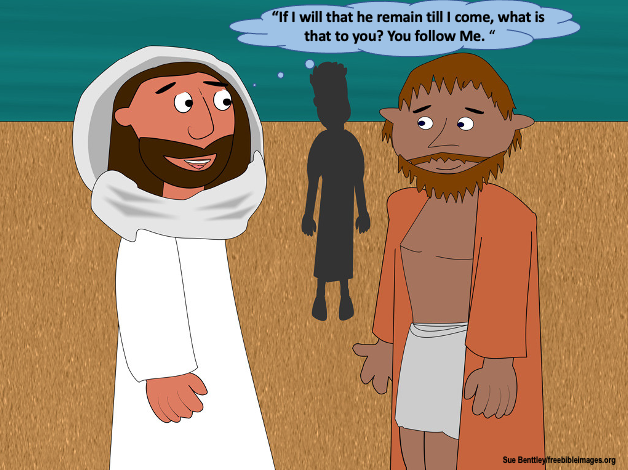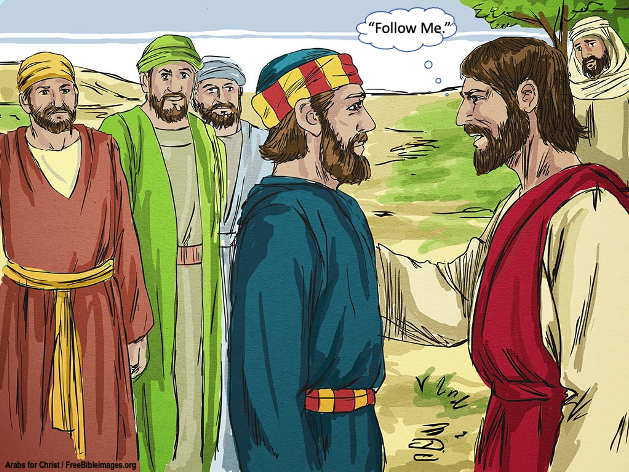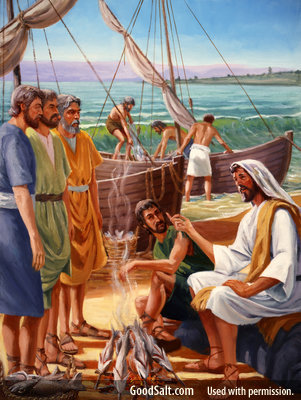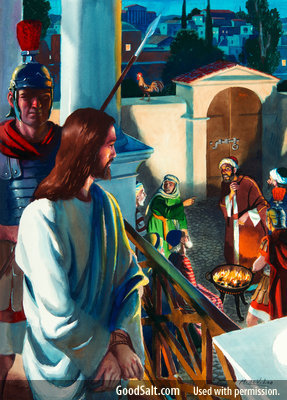“And there are also many other things that Jesus did, which if they were written one by one, I suppose that even the world itself could not contain the books that would be written. Amen.” John 21:25
When we were living in the Philippines, I was not able to watch my favorite sports teams in America play their games live on TV because of the time difference. But I always tried to watch the highlight reels of their games so I could see the most significant plays.
The apostle John has given us a highlight reel of Jesus Christ in his book. He did not include all that Jesus said and did, but he included the most significant things we need to know to fulfill his evangelistic purpose (John 20:31).
As we come to the end of the gospel of John, the apostle John concludes with an afterthought of his book that affirms the truthfulness of his gospel. He writes, “This is the disciple who testifies of these things, and wrote these things; and we know that his testimony is true.” (John 21:24). The author of this gospel is none other than “the disciple whom Jesus loved” (John 21:20). 1 The phrase “these things” refers to the entire gospel. 2 John is testifying that what he “wrote” is “true.” All that we read in the gospel of John is based on his eyewitness testimony.
Some believe that the phrase “we know that his testimony is true” was written by someone other than John. There are scholars who view the “we” as the elders of the Ephesian church where John traditionally served late in his life. 3 Others think that they were influential men in John’s church, though not necessarily in Ephesus. 4 Another view states this is an indefinite reference similar to “as is well known.” 5
It is better to see this phrase referring to John as he uses the editorial “we” to affirm the accuracy of what he has written. 6 The editorial “we” is a rhetorical device used to refer to the author’s self. Using the first person plural, as authoritative people sometimes do, is something the apostle John does with regularity (cf. John 1:14; 3:2, 11; 20:2; 1 John 1:2, 4, 5, 6, 7; 3 John 1:12). 7 In favor of this view is also the use of the first person singular in the next verse (“I suppose…”).
Before we look at the last verse of this incredible book, let’s glance at the prologue of this gospel (John 1:1-18). “In the beginning was the Word, and the Word was with God, and the Word was God.“ (John 1:1). John began his gospel with “the Word,” Jesus Christ (John 1:1, 14-17), Who is “God.” He informs us that “all things were made through Him” (John 1:3; cf. Genesis 1:1; Colossians 1:16; Hebrews 1:2). The Person of Jesus Christ cannot be contained in this world because He is its Creator God. As God, He is independent of creation. He is not dependent on anyone or anything to sustain Him.
But John also wants us to know that “the Word became flesh” (John 1:14). Jesus humbled Himself by becoming a human being without ceasing to be God (John 1:1; 14; Philippians 2:6-8). This is why John refers to Jesus as “the only begotten Son” (John 1:18). The phrase “only begotten Son” does not mean Jesus had a beginning like a baby that is birthed by his parents, as many false religions teach today. The compound Greek word translated “only begotten” is monogenḗs, which literally means “one (monos) of a kind (genos)” or “unique kind.” 8Jesus Christ is the only one of His kind. He is fully God (John 1:1-3) and fully Man (John 1:14). This is the message of the gospel of John.
The writer of this gospel, the apostle John, goes to great lengths to show Jesus’ deity (John 1:1, 34, 49; 5:16-47; 6:69; 8:57-59; 10:30-33; 11:27; 20:28; et. al). Jesus was unlike any other Person who has walked on this earth. In the Old Testament, the phrase “I AM” is how Jehovah God identified Himself to Moses at the burning bush (Exodus 3:13-14). “I AM” is also how Jesus identified Himself to the people of Israel. He makes several “I AM” statements in the gospel of John: “I am the bread of life” (John 6:35), “I am the door” (John 10:9), “I am the Good Shepherd” (John 10:14), “I am the Resurrection and the Life” (John 11:25), “I am the way, the truth and the life” (John 14:6), “I am the true vine” (15:1). Each one of these staggering statements attested to the fact that Jesus was and is God.
Jesus also claimed to be equal with God and to be God Himself (John 5:17-18; John 10:10-33). This is why His enemies wanted to kill Jesus for blasphemy (Leviticus 20:10; cf. John 5:18; 8:59; 10:31-33; 11:8). For example, when Jesus said, “He and the Father are one” (John 10:30), the Jews understood Him to claim to be God. They said, “For a good work we do not stone You, but for blasphemy, and because You, being a Man, make Yourself God” (John 10:33).
Did Muhammed, the founder of Islam, orBuddha, the founder of Buddhism, or Confucius, the founder of Confucianism, or Joseph Smith, the founder of Mormonism, or Charles Taze Russell, the founder of Jehovah Witnesses, or Ellen G. White, the co-founder of Seventh Day Adventist, claim to be equal with God? No!Jesus Christ not only claimed to be God, He proved He was God through His works (John 1-12), the greatest of which was His resurrection from the dead (John 20:1-18; cf. Romans 1:3-4)!
John also goes to great lengths to show Jesus’ humanity (John 1:14; 4:6; 11:35; 12:27; 19:28; et. al). Jesus had brothers and sisters like you and me (John 2:12; 7:3, 5; cf. Mark 6:3). Christ ate food and got thirsty just like you and me (John 19:28; 21:12, 15; cf. Matthew 9:11; 11:19; Mark 2:16; Luke 7:34). He experienced physical fatigue and even slept (John 4:6; cf. Matthew 8:24; Mark 4:38; Luke 8:23). Why? He became a man without ceasing to be God so He could understand what it is like for you and me to have family, food, and fatigue. The God of the Bible is not some distant uncaring deity like the religions of the world. He understands our needs and He came to earth to meet our most fundamental needs to be seen, safe, soothed, and secure.
When John says that Jesus was “is in the bosom of the Father” (John 1:18b), he is referring to Christ’s very close and intimate relationship with God the Father. The word “bosom” (kolpos) refers to the upper part of the chest where a garment naturally folded to form a pocket. 9 The picture here is that of a son resting his head on the chest of his father, experiencing a very close and intimate relationship with him. Jesus had the closest and most intimate relationship with God the Father. He knows the heart of God the Father better than anyone because His head often rested upon His Father’s chest in eternity past.
Who better to tell others what a Person is like than the One who is closest to that Person and has known Him the longest in an intimate relationship!?! There is no one more qualified to tell us what God is like than the only begotten Son of God who has known God the Father forever in the closest of relationships with Him.
This is why John then says, “He has declared Him” (John 1:18c). The word “declared” (eksēgéomai) is where we get our English words, “exegete” and “exegesis” from. It means “to set forth in great detail, expound.” 10 In seminary, we learned to “exegete” or explain God’s Word, the Bible. We were taught to “read out” of the Bible God’s intended meaning through a grammatical, historical, and literal interpretation instead of “reading into” the Bible our own biases and assumptions.
God the Son, Jesus Christ, has “exegeted” or “explained, interpreted, or narrated” what God the Father is like. Jesus is more qualified than anyone else to explain what God the Father is like because He, being God, knows God the Father longer and more intimately than anyone else.
Understanding the uniqueness of Jesus Christ, the God-Man, will help us understand why John concludes his book with the following words: “And there are also many other things that Jesus did, which if they were written one by one, I suppose that even the world itself could not contain the books that would be written. Amen.” (John 21:25). John is telling us that he did not record everything “Jesus did.” He wrote selectively about the life and ministry of Jesus on earth. 11In other words, John gave us “a highlight reel” of Jesus!12 This highlight reel makes all others look pale in comparison.
Take for example a highlight reel of the greatest sports figures in history. None of them – whether it be Mohammed Ali, Lebron James, Michael Jordan, Tiger Woods, Michael Phelps, Jim Brown, Tom Brady, Babe Ruth, Hank Aaron, Pele’, Florence Griffith Joyner, Usain Bolt, Serena Williams, or Ronda Rausey – can come close to what Jesus Christ has done.
The Lord Jesus has loved people perfectly, giving His life for the sins of the world (John 1:29; 3:16; Romans 5:8). By His grace He has forgiven people perfectly no matter how badly or often they have sinned (John 4:1-29; Acts 10:43; Colossians 2:13-14; I Timothy 1:14-16). He has given eternal life freely to all who believe in Him (John 3:16). He has granted a forever relationship to the religious (John 3:1-18). Christ has saved from hell forever all who have trusted in Him (Acts 16:31; Ephesians 2:8-9). He has transformed sinners into saints the moment they believed in Him (I Corinthians 1:1; 2 Corinthians 5:17; Ephesians 1:1, 13-14). Jesus has given hopeless people a purpose for living (Romans 8:28). He has granted contentment to those who could not find satisfaction (Philippians 4:11-13). He has given those who have greatly failed a second chance (John 21:15-17). He has bestowed peace upon the troubled (John 14:27; 16:33; Ephesians 2:14-15). And Christ Jesus has never lost one person He has saved, and He never will (John 6:35-40; 10:28-29).
No sports figure, politician, Hollywood celebrity, or philanthropist can do what Jesus Christ has done and continues to do. His life and ministry make Him unique. His highlight reel is superior to all others even though it does not include all that Jesus ever did.
“But God providentially determined that what we have in Scripture is enough. You don’t need to know everything that Jesus did and said. But, John says, you do need to ‘believe that Jesus is the Messiah, the Son of God, and that by believing you may have life in his name’ (20:31). Amen.” 13
But John did say if all that Jesus did on earth “were written one by one… the world itself could not contain the books that would be written.” To date, countless books have been written on what little was actually recorded in the gospels about Jesus Christ. “Jesus is surely the most written-about person of all time—and rightly so!” 14 When you consider the thousands of historical books, theological books, religious books, scholarly books on the gospels, testimonial books, and articles about Jesus Christ, the numbers are endless! Isn’t that what we would expect from Someone Who is uniquely God and Man!?!
There is no end to the books written about Jesus Christ because He is still working in peoples’ lives today – giving them His life freely through believing in Him (John 3:16; 10:10b) so they can experience His life abundantly as they learn to follow Him as a disciple (John 10:10c; cf. 8:31-32; 13:34-35; 15:1-8; 21:15-23).
For me, the gospel of John is one of the greatest books of the Bible because it repeatedly shows God’s grace and truth through the Person of Jesus Christ. It also tells us over and over again what one must do to have eternal life now (John 3:16; 17:3) and a future home in heaven (John 14:2-3). It tells us to simply believe in Jesus alone for His free gift of eternal life (John 1:12; 3:15-18, 36; 4:10-14; 5:24; 6:35-40, 47; 7:37-39; 9:35-38; 10:24-29; 11:25-27; 14:1; 20:31; et al.). Jesus did not say, “whoever behaves.” He said, “whoever believes…” (John 3:16). Believe in Him alone and He will give you His never-ending life so you can experience it abundantly in your daily life.
Prayer: Father God, thank You for the gospel of John which gives us all we need to know to believe that Jesus is the Christ, the Son of God, that believing we may have life in His name. There is no one like You, Lord Jesus. There is no one who forgives and loves us like You do. Thank You for revealing Yourself to us through the gospel of John. Please enable us to share this life-changing book with a lost world so they may discover the radical love you have for them and come to believe in You alone for Your gift of eternal life. Getting right with You, Father God, is based upon believing, not behaving. May Your Holy Spirit convict people of this profound and simple life-changing truth. And may those of us who have eternal life through Jesus, experience His abundant life as we learn to follow Him as His disciple. In the matchless name of Jesus Christ we pray. Amen.
ENDNOTES:
1. Archibald Thomas (A. T.) Robertson, Robertson’s Word Pictures in Six Volumes, (The Ephesians Four Group, 2014 Kindle Edition), Kindle Locations 78628-78629).
2. Edwin A. Blum, The Bible Knowledge Commentary Gospels, Editors John F. Walvoord and Roy B. Zuck, (David C Cook, 2018 Kindle Edition), pg. 705.
3. Tom Constable, Notes on John, 2017 Edition, pg. 402 cites Brooke Foss Westcott, The Gospel According to St. John: The Authorised Version with Introduction and Notes 1880 (London: James Clarke & Co., Ltd., 1958), pg. 306. .
4. Ibid., cites Rudolf Bultmann, The Gospel of John: A Commentary (Translated by G. R. Beasley- Murray, R. W. N. Hoare, and J. K. Riches. Oxford: Blackwell, 1971), pp. 717-718.
5. Ibid., cites C. H. Dodd, “Note on John 21, 24,” Journal of Theological Studies NS4 (1953):212-13.
6. Robert Wilkin; J. Bond; Gary Derickson; Brad Doskocil; Zane Hodges; Dwight Hunt; Shawn Leach. The Grace New Testament Commentary: Revised Edition (Grace Evangelical Society, Kindle Edition, 2019), pg. 570.
7. Constable, pg. 402.
8. Walter Bauer, A Greek-English Lexicon of the New Testament and Other Early Christian Literature: Third Edition (BDAG) revised and edited by Frederick William Danker (Chicago: University of Chicago Press, 2000 Kindle Edition), pg. 658.
9. Ibid., pp. 556-557.
10. Ibid., pg. 349.
11. Wilkin, pg. 570.
12. Tony Evans, CSB Bibles by Holman. The Tony Evans Bible Commentary (B & H Publishing Group, Kindle Edition, 2019), pg. 1834.
13. Ibid.
14. Wilkin, pg. 570.








